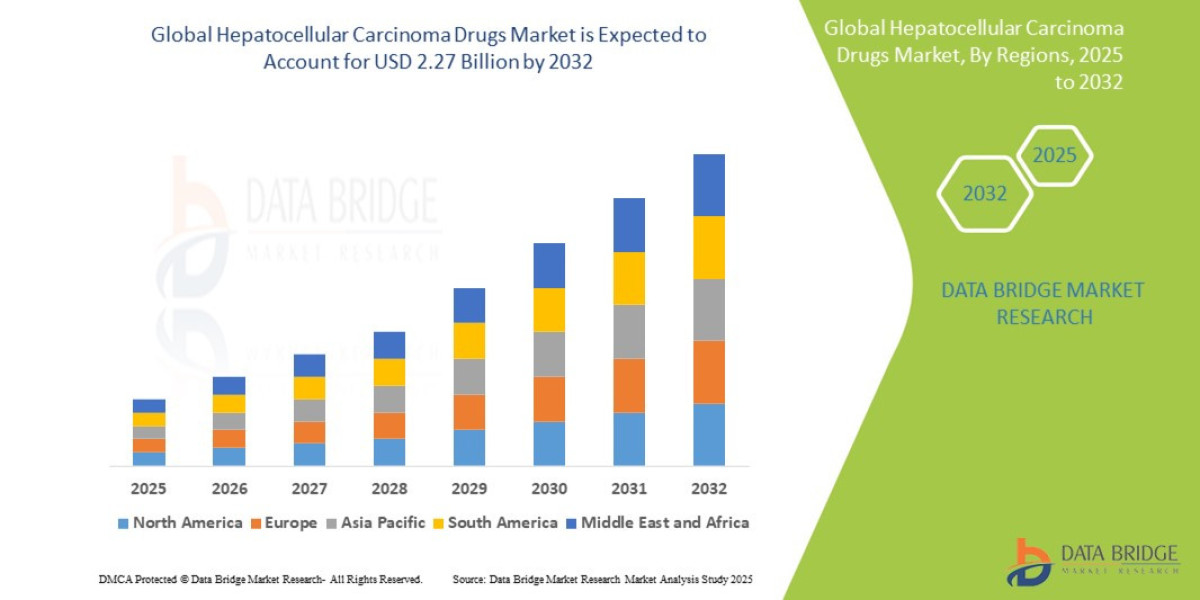Hepatocellular Carcinoma Drugs Market Overview
The Hepatocellular Carcinoma (HCC) Drugs Market is witnessing significant growth, driven by the rising incidence of liver cancer worldwide, advancements in targeted therapies, and growing awareness about early cancer diagnosis. Hepatocellular carcinoma, the most common type of primary liver cancer, typically develops in individuals with chronic liver diseases such as hepatitis B, hepatitis C, or cirrhosis.
The global Hepatocellular Carcinoma Drugs Market was valued at USD 1.21 billion in 2024 and is expected to reach approximately USD 2.27 billion by 2032, expanding at a CAGR of 8.2% during the forecast period. The market growth is attributed to increasing research and development (R&D) activities, rising adoption of immunotherapies, and the growing availability of combination treatment options for advanced-stage liver cancer.
Competitive Landscape
The Hepatocellular Carcinoma Drugs Market is moderately consolidated, with leading players focusing on innovation, partnerships, and regional expansion. Key companies are Exelixis, Inc. (U.S.), Merck & Co., Inc. (U.S.), AstraZeneca (U.K.), Bristol-Myers Squibb Company (U.S.), Eli Lilly and Company (U.S.), SillaJen, Inc. (South Korea), Bayer AG (Germany), Janssen Global Services, LLC (U.S.), Pfizer Inc. (U.S.), F. Hoffmann-La Roche Ltd (Switzerland), Gilead Sciences, Inc. (U.S.), GSK plc (U.K.), Takeda Pharmaceutical Company Limited (Japan), Eisai Co., Ltd. (Japan), Amgen Inc. (U.S.), Polaris Group (U.S.), Hepion Pharmaceuticals, Inc. (U.S.), Provectus Biopharmaceuticals Inc. (U.S.)
Request Sample For Hepatocellular Carcinoma Drugs Market @ https://www.databridgemarketresearch.com/request-a-sample?dbmr=global-hepatocellular-carcinoma-drugs-market
Hepatocellular Carcinoma Drugs Market Trends
- Rising Adoption of Immunotherapy: Immune checkpoint inhibitors are increasingly used as first-line or combination therapy for advanced HCC.
- Focus on Combination Treatment Regimens: Combining immunotherapy with targeted agents is improving efficacy and survival outcomes.
- Emergence of Biomarker-Based Therapies: Precision medicine approaches are helping identify suitable candidates for specific drug therapies.
- Increased R&D and Clinical Trials: Pharmaceutical companies are expanding clinical studies to test novel mechanisms of action and drug combinations.
- Shift Toward Personalized Cancer Medicine: Genetic profiling is guiding the selection of customized treatment plans for HCC patients.
Hepatocellular Carcinoma Drugs Market Segmentation
By Therapy Type:
- Targeted Therapy
- Immunotherapy
- Chemotherapy
- Combination Therapy
By Route of Administration:
- Oral
- Injectable
By Distribution Channel:
- Hospital Pharmacies
- Retail Pharmacies
- Online Pharmacies
Regional Insights
North America holds a dominant Hepatocellular Carcinoma Drugs Market Share, attributed to its advanced healthcare infrastructure, high diagnosis rates, and strong presence of key pharmaceutical companies. The United States leads the region due to increased patient awareness, strong research funding, and availability of cutting-edge therapies.
Europe follows closely, driven by favorable government initiatives for cancer care, robust clinical research programs, and rising adoption of targeted therapies. The United Kingdom, Germany, and France are major contributors to market growth.
Asia-Pacific is projected to exhibit the fastest growth rate during the forecast period. The region’s high prevalence of hepatitis infections, growing healthcare spending, and expanding clinical trials landscape in countries such as China, Japan, and South Korea are fueling demand for HCC drugs.
Latin America and Middle East & Africa are gradually emerging markets with improving access to cancer therapies and growing awareness about early liver cancer diagnosis and treatment.
Hepatocellular Carcinoma Drugs Market Drivers
- Rising Incidence of Liver Cancer Driving Market Demand
The growing burden of liver cancer is one of the key factors propelling the Hepatocellular Carcinoma Drugs Market. According to recent global cancer data, liver cancer ranks among the top causes of cancer-related deaths. This surge is linked to high rates of alcohol consumption, obesity, and viral hepatitis infections. The need for effective drugs that improve survival rates and quality of life among liver cancer patients is driving investment in novel therapeutic developments.
Early diagnosis initiatives and increasing government support for liver disease screening programs are also positively influencing the market landscape. The rising healthcare expenditure in emerging economies is expected to further boost demand for advanced drug therapies.
- Advancements in Targeted and Immunotherapies
A major trend shaping the Hepatocellular Carcinoma Drugs Market is the rapid evolution of targeted therapy and immunotherapy. Traditional chemotherapy has limited effectiveness in treating advanced HCC due to severe side effects and poor response rates. However, targeted drugs such as tyrosine kinase inhibitors (TKIs) and monoclonal antibodies have shown remarkable efficacy by specifically targeting cancer cell growth and angiogenesis pathways.
Immunotherapy, particularly immune checkpoint inhibitors (ICIs), has transformed the treatment landscape. These therapies harness the body’s immune system to attack cancer cells, leading to longer survival outcomes and better tolerance compared to conventional chemotherapy. Combination regimens of targeted drugs and immunotherapy agents are showing promising results in clinical trials, offering new hope for patients with late-stage HCC.
Future Outlook for Hepatocellular Carcinoma Drugs
The Hepatocellular Carcinoma Drugs Market Outlook is set for strong expansion as research innovations reshape liver cancer treatment approaches. With the growing adoption of precision medicine, targeted drug delivery, and immuno-oncology, patient outcomes are expected to improve substantially over the next decade.
Furthermore, expanding access to advanced therapies in emerging economies and continuous pipeline advancements will sustain market momentum. The future of HCC treatment lies in combination regimens, biomarker-guided therapy, and next-generation immunotherapies, which promise better efficacy and longer survival benefits for patients worldwide.
About Us:
Data Bridge is one of the leading market research and consulting agencies that dominates the market research industry globally. Our company’s aim is to give clients the knowledge they require in order to function in changing circumstances. In order to give you current, accurate market data, consumer insights, and opinions so that you can make decisions with confidence, we employ a variety of techniques, including surveys, video talks, and focus groups around the world.
Contact :
Data Bridge Market Research Private Ltd .
3665 Kingsway — Suite 300 Vancouver BC V5R 5W2 Canada
+1 614 591 3140 (US)
+44 845 154 9652 (UK)








